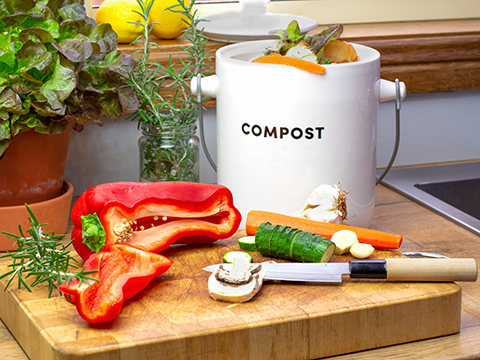News

Kitchen Compost Creates Healthy Soil

By Jeremy Oettinger, Resource Conservationist.
When you throw away your garbage, do you ever think about where it goes? Most household waste goes into a landfill, where it is out of sight and out of mind.
However, many people choose to recycle products such as aluminum and cardboard to repurpose their waste and avoid the landfill. Just as your old cardboard box can be recycled in order to be reused, food waste can be composted in order to become a valued-added product.
Compost is organic matter, such as food scraps and lawn clippings, that have decomposed. Compost is incredibly rich in nutrients that can be used as a soil supplement for growing plants. At the Conservation District office, we compost our food waste in order to create a soil supplement for the bioswale located on-site.
A bioswale is a broad, shallow channel made to collect and direct water from rain and snowmelt (known as stormwater), and in the process remove pollutants. It contains native plants which look beautiful, attract butterflies, and remove pollutants all at the same time! The compost provides nutrients and soil cover to aid in healthy plant growth.
Organic matter is an important part of soil composition. For many soils, such as the rocky soils of Pike County, compost can be a welcome structural addition. It can create more empty space or air, essentially making the soil more “fluffy.” This allows room for water and nutrients to travel though it.
Compost at Home
If you want to start composting in your home or office, it is very simple to get started.
- Begin by collecting food scraps, but skip the dairy, bones, and fats to avoid strong odors that may attract animals.
- Make a pile in your backyard or use a prefabricated container to hold all of your compostable items.
- Make sure to include high carbon items (sometimes called browns) such as cardboard and lawn clippings.
- Turn the pile occasionally and check that the material feels moist to the touch in order to provide ideal conditions for decomposition. The compost pile should reach temperatures as high as 150 degrees on the inside as the waste breaks down.
As you make compost, keep in mind all the pounds of waste not being trucked to a landfill, and all the nutrients returning to the soil to be reused. You may be surprised at how much waste you can repurpose!
